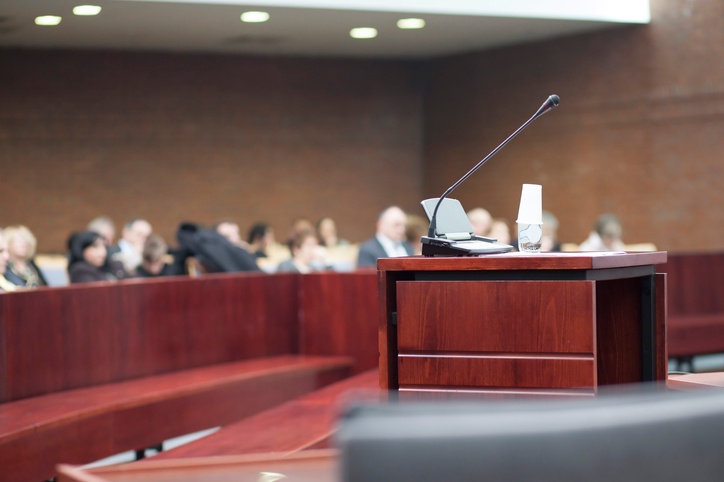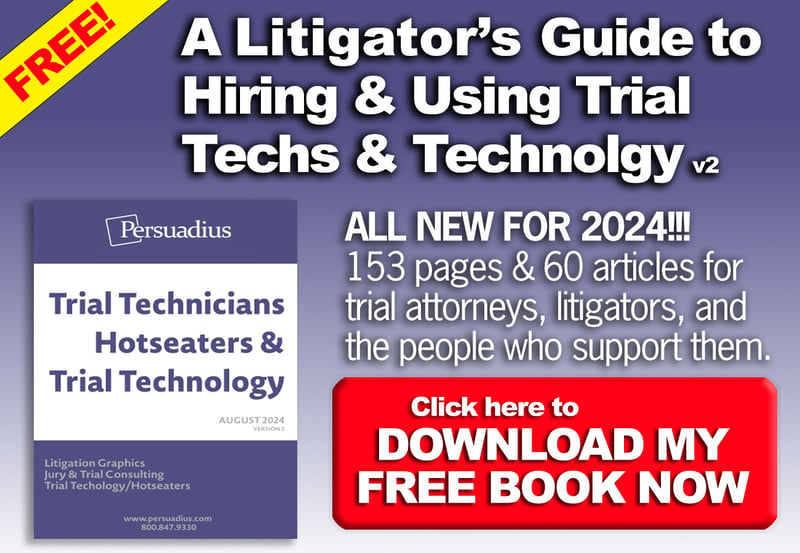The trial technician, sometimes called the hot-seater, is the person who runs the courtroom technology so that a trial team does not have to do so. A trial tech typically uses programs like OnCue or Trial Director to manage thousands of exhibits and has each at the ready to be displayed and highlighted. During opening, closing, and expert testimony, the trial tech runs the PowerPoint system to ensure flawless and well-choreographed presentations.
The benefit of using a trial technician is that the trial team can focus on the law and the facts and can concentrate on connecting with the judge and jury rather than having to worry about the technology. When the relationship between trial counsel and the trial tech is smooth and well-rehearsed, the presentation looks like a perfectly planned and executed professional live production.
We have been deploying trial technicians around the country for trials long and short for the past three decades. We were even sending out trial techs before PowerPoint was being used in the courtroom and when the preferred format for electronic evidence handling was the laser disk.
In this time, we have employed dozens of trial techs and have learned what makes a good one and what kind of preparation equals success. Here are 12 tips for finding just the right technician:
1. Experience is everything. Our techs usually have a dozen or more major trials under their belts. Some have been to trial hundreds of times. They also routinely run the technology at hearings and during arbitrations/mediations. See, With So Few Trials, Where Do You Find Trial Experience Now?
2. The first-chair attorney must be willing to practice with them. There is no substitute for practice and preparation in the courtroom. The great trial lawyers practice frequently so that the trial looks flawless. See Practice, Say Jury Consultants, is Why Movie Lawyers Perform So Well.
3. They have war stories galore - particularly in overcoming problems. Courtrooms are not usually state of the art, so much of the technology must be brought in or enhanced. Otherwise, jurors are left wondering why their own living rooms and work conference rooms are much more advanced than what your trial team is providing. Great trial techs have overcome hundreds of small issues in a trial. See 12 Ways to Avoid a Trial Technology Superbowl-style Courtroom Blackout.
4. They are unflappable. See 11 Traits of Great Courtroom Trial Technicians.
5. They have rules. My favorite trial techs say things like, “I will not work past one a.m. on a trial night” or “We need enough budget for complete redundancy.” They have these rules because they know how to make you look good.
6. They know when others are making mistakes. They know how and when to offer help to the opposition in a way that makes our side look accommodating and compassionate. See 24 Mistakes That Make For a DeMONSTERative Evidence Nightmare.
7. They don't overpromise. See 15 Tips for Great Customer Service from the Restaurant Industry.
8. They chime in when asked. Very often, trial counsel wants an opinion from a fresh set of eyes and most of the time, a trial technician is far enough removed from the case that they can provide a commonsense take on the question posed. See 7 Reasons a Fresh Pair of Eyes Are Beneficial Before Trial.
9. They don't chime in when not asked. I find that great trial technicians stay in their zone and don't reach outside their area of expertise. They may know PowerPoint well, but they don't pretend to be experts in visual messaging. They may have seen hundreds of opening statements, but they don't speak up with tips for trial counsel unless asked. As number 8 above implies, they reply when asked.
10. They know when to ask for help. Confident people ask for help easily. The insecure pretend they have everything under control. This is true for trial counsel and trial technicians alike.
11. They know the technology inside and out. See Today's Tech Failure at the George Zimmerman Trial Takes Center Stage.
12. Download A2L's free trial technician guidebook for lawyers and legal professionals. It is packed with even more ideas using trial technicians effectively. Free download: How To Find and Use Trial Technicians and Trial Technology — A Must-Have Complimentary 83-page Guidebook for Trial Lawyers.
Other A2L articles related to trial technology, trial tech's, and hot seaters include:
- Why Trial Tech ≠ Litigation Graphics
- What Does Using a Trial Technician or Hot-Seater Cost?
- Conflict check/availability of a trial technician. Completely Confidential.
- 5 Tips for Displaying Documents Well at Trial [CVN Video]
- 5 Trial Director Techniques for Seamless Trial Presentations
- Trial Presentation Too Slick? Here's Why You Can Stop Worrying
- 12 Ways to SUCCESSFULLY Combine Oral and Visual Presentations
- 16 PowerPoint Litigation Graphics You Won't Believe Are PowerPoint
- The 14 Most Preventable Trial Preparation Mistakes
- 11 Traits of Great Courtroom Trial Technicians
- 6 Tips for Effectively Using Video Depositions at Trial
- Making Good Use of Trial Director & Demonstratives in an Arbitration
- Why Trial Tech ≠ Litigation Graphics
- 7 Things You Never Want to Say in Court
- Trial Exhibits: Using the Document Call-Out to Persuade
- 3 Styles of Document Call-outs Used at Trial
- 5 Tips for Using TrialDirector and Trial Technicians Effectively
- Today's Tech Failure at the George Zimmerman Trial Takes Center Stage
- 8 Trial Technician-Related Tips for Midsized Law Firms






Leave a Comment